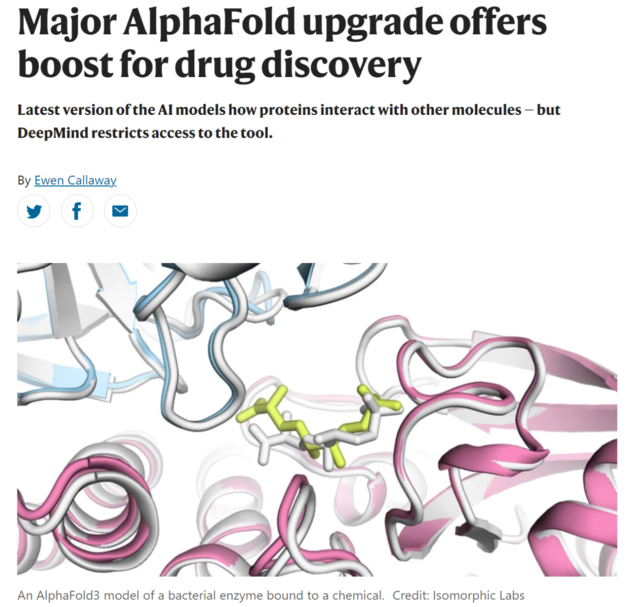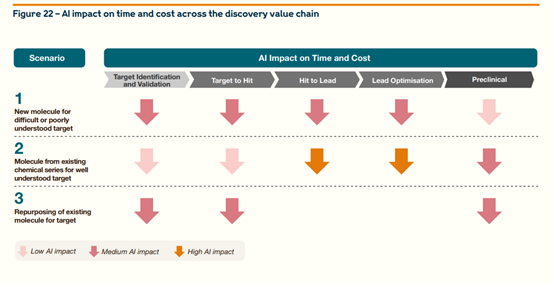The key challenge in drug development, predicting the three-dimensional structure of proteins starting from amino acid sequences, has once again been solved by artificial intelligence (AI)!

Photo/Nature
On May 8th, local time, Google’s DeepMind and its sister company Isomorphic Labs jointly launched AlphaFold 3, which immediately made the front page of Nature magazine. AlphaFold 3, the third generation of AlphaFold, is claimed by DeepMind to predict the complex structures of almost all molecular types in the “protein database” with unprecedented accuracy.
As AI demonstrates remarkable potential in the field of drug development, it’s not just Google that’s eyeing the AI drug development track. Tech giants like Microsoft, Amazon, and NVIDIA are also developing or investing in related projects.
This surge of interest has been accompanied by a significant influx of “hot money.” Data shows that since 2021, there have been 281 venture capital deals for global AI drug development startups, totaling an investment of $7.7 billion. Media forecasts suggest that the potential market size for AI drug development could be close to $50 billion (approximately 361.3 billion yuan), with the expectation that by 2025, 30% of new drugs will be developed using AI.
Tech Companies Increase Investment in AI Drug Development
According to a paper published in Nature, AlphaFold 3 achieved a 50% improvement in accuracy over the best existing traditional methods on a benchmark test for protein-protein interactions. This was achieved without any input structural information, making AlphaFold 3 the first AI system to surpass physics-based methods in biological structure prediction.
AlphaFold 3 is considered revolutionary because protein-protein interactions are crucial for drug discovery and development. Proteins range from enzymes essential for human metabolism to antibodies that fight infectious diseases.
Reportedly, AI models can be trained on billions of different protein sequences and their underlying structures to fully simulate proteins, eliminating the need for expensive molecular dynamics simulation calculations. For instance, Eli Lilly has been using AI to search millions of molecules, completing in 5 minutes what would take a traditional lab an entire year to synthesize. Therefore, it makes sense to test the limits of AI in medicine.
As AI demonstrates its remarkable potential in drug development, more than just Google are eyeing the AI drug development market. Almost all tech giants have shown interest in the AI pharmaceutical field, with companies like Microsoft, Amazon, and Salesforce working on protein generation projects.
Reportedly, last year alone saw the birth of several AI-powered large language models and tools for medicine: Salesforce launched the protein generation AI large language model ProGen; Microsoft released the general AI framework EvoDiff for protein generation; Amazon released the protein folding tool for its AWS machine learning platform SageMaker; Nvidia launched the generative AI cloud service BioNeMo for drug discovery, and invested in pharmaceutical companies Recursion Pharmaceuticals and Iambic Therapeutics.
In addition to the influx of Silicon Valley giants into AI drug development, the explosion of ChatGPT in late 2022 has also driven many AI startups into the field.
In 2023, biotechnology market research firm Deep Pharma Intelligence released an analysis report on the AI drug development industry. The report found that after in-depth research on more than 800 AI companies, 1900 investors, and other industry participants, 91 of these 800 AI-focused companies were founded between 2022 and 2023. These companies are mostly AI startups.
In addition, the report states that there is a growing trend of collaboration between large pharmaceutical companies and AI startups. The reporter noted that in April of this year, Moderna and OpenAI announced a collaboration to jointly innovate and promote the potential of AI in healthcare.
Amgen and Nvidia have also established an AI-focused partnership, and Amgen has begun to apply predictive models to the pharmaceutical process. Nvidia's Vice President of Healthcare, Kimberly Powell, said this has enabled Amgen to reduce antibody design from two years to nine months.
It is reported that launching a new drug typically takes over a decade and costs an average of at least $2.6 billion, with a maximum of $6 billion. The advent of AI offers a potential solution to the pharmaceutical industry, where costs are constantly rising and returns are diminishing. According to a report released last year by consulting firm BCG, AI can save at least 25% to 50% of the time and cost in the drug discovery step before clinical trials.

Photo/BCG report
AI Drug Development Market Booms, but Data Remains a Challenge
As AI pharmaceuticals gain popularity, venture capital is also pouring in.
According to Pitchbook data, since 2021, there have been 281 venture capital deals in global AI drug development startups, with a total investment of $7.7 billion. Looking further back, between 2014 and 2023, AI-driven pharmaceutical investment surged to a cumulative $603 billion, also demonstrating AI's transformative potential.
For example, in the past two years, Nvidia's AI drug development platform BioNeMo's venture capital arm Nventures has invested most of its money in drug development projects. Data shows that 7 of Nventures' 19 investment deals were in AI drug development startups.
In an interview with the media, Kimberly Powell said that healthcare will be Nvidia's next "multi-billion dollar business". Nvidia CEO Jensen Huang has also repeatedly emphasized that digital biology will be "the next amazing disruptive technology."
According to a report released by Deep Pharma Intelligence last year, AI companies focusing on early drug development account for nearly 40%, making early drug development the dominant field and one of the most trustworthy areas from an investment perspective. There are many reasons for this, such as this is a data-intensive stage that requires virtual screening, iterative learning, and identification and validation of targets (compounds).
Regarding the role of AI in the early drug development process, Kimberly Powell predicts that generative AI may influence discovery by generating ideas that humans would not naturally come up with. "It could be a protein that nature has never made before, in a way that could also be a therapeutic protein, or it could be a compound that we have not yet synthesized and that does not exist in any database in the world."
AI can also be seen in the backend of drug development. According to foreign media analysis, it can help collect data from thousands of documents to prepare for submission to the US Food and Drug Administration (FDA). Similarly, AI may play a role in technology transfer by making data more accessible.
However, high-quality training data remains a major challenge in AI-assisted drug development. Menlo Ventures partner Greg Yap said, "The biggest obstacle is finding reliable training data. These models are being trained on every piece of public scientific data that describes molecular interactions, but some of the data is not very clean and there are errors."
Once the scientific community can find ways to improve the quality of training sets, the AI-assisted drug discovery market is expected to take off. Foreign media predicts that the potential market size is close to $50 billion (equivalent to RMB 361.3 billion), and it is estimated that by 2025, 30% of new drugs will be developed using AI. However, AI-based drug development is still in its early stages. According to reports, the FDA has so far approved clinical trials for over 100 drug candidates developed using AI or machine learning, but it may take years to market.
Disclaimer: The content and data in this article are for reference only and do not constitute investment advice. Verify before using.


 川公网安备 51019002001991号
川公网安备 51019002001991号





